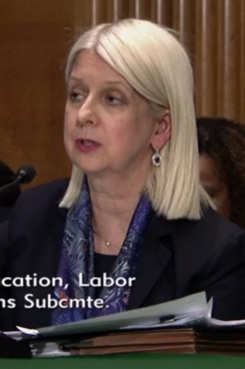US Chamber Pushes Benefits for Gig Workers, but Don't Call Them Employees
“The current legal and regulatory scheme effectively discourages companies who utilize independent workers from offering retirement benefits,” Seyfarth Shaw's Camille Olson, on behalf of the U.S. Chamber, told a U.S. Senate subcommittee on Tuesday.
February 06, 2018 at 06:55 PM
5 minute read
 Uber headquarters, located in San Francisco, CA. Credit: Jason Doiy / ALM
Uber headquarters, located in San Francisco, CA. Credit: Jason Doiy / ALM
The current labor framework inhibits gig economy companies from offering employee benefits and other protections, including retirement savings programs, without “jeopardizing the legal status” of their business models, a Seyfarth Shaw partner told a congressional panel Tuesday on behalf of the U.S. Chamber Commerce.
Camille Olson, co-chair of the firm's national litigation team, said the U.S. Chamber wants to “enhance the flexibility, portability and certainty of the retirement system to allow independents to obtain retirement security.”
Olson made clear, however, that any movement to ensure these gig workers have access to benefits should not force innovative companies to classify independent contractors as employees.
 Seyfarth Shaw's Camille Olson. Credit: Senate HELP Committee
Seyfarth Shaw's Camille Olson. Credit: Senate HELP Committee“Developing policies that promote a positive business environment, encourage innovation, and protect workers' financial futures while also preserving flexibility is an important and challenging balance for this subcommittee to strike,” she told members of a Senate Health, Education, Labor and Pensions subcommittee. She continued: “The current legal and regulatory scheme effectively discourages companies who utilize independent workers from offering retirement benefits.”
Many of the large gig economy companies such as Uber, Lyft and GrubHub build their business by classifying their workers as independent contractors. These workers generally are not entitled to the benefits such as workers' compensation, health care and retirement. The companies argue their workers benefit from the flexibility of not having to report to a boss.
The subcommittee heard from experts who stressed the importance of providing retirement benefits to not just gig economy workers, but the rising number of contract workers in the United States.
“The hype off the gig economy gives a new face to the damaging trend of eroding benefits,” said Sen. Patty Murray, D-Washington, the ranking Democrat on the Senate HELP committee. “There is new technology and new lingo but the challenges are not new.”
Confronting the gig business model, although still a small fraction of the overall economy, is ever more a focus for state and federal lawmakers, unions and the workers themselves. Workers rights group contend the arguments by companies to avoid classifying workers as employees is an old tactic to avoid paying benefits. Last year, GrubHub went to trial over the classification of its workers. There have been several major settlements with companies including Uber and Lyft over this open question.
On Monday, a federal appeals panel took up labor issues in the gig economy—reviewing a Seattle ordinance that would allow ride-hailing drivers to unionize. The U.S. Chamber sued the city over the ordinance, arguing it violated federal labor and antitrust laws.
The city acknowledged that its ordinance would be a test for the gig economy. A win for Seattle could push other local governments to follow suit in creating ways for the gig workers to take advantage of traditional benefits. Jones Day's Michael Carvin argued for the U.S. Chamber at Monday's hearing in the U.S. Court of Appeals for the Ninth Circuit.
On Capitol Hill in Washington, Olson offered several solutions to the portable retirement benefit system, including increasing the availability and access to retirement and financial education regarding existing vehicles.
Olson also said gig economy companies should be allowed to provide benefit information to independent contractors, assist with the administration and facilitation of direct deposit of funds into retirement vehicles and to contribute to portable retiree benefits for the benefit of independents.
Olson said contractors should be given monetary incentives to save for retirement and it should be ensured that companies can facilitate these measures without affecting the workers' status as an independent contractor.
Monique Morrissey, an economist at the Economic Policy Institute, said the structure of the labor system disproportionately creates barriers for low-income workers. She disagreed with the other panelists that standards should be loosened for who classifies as a worker and that tax incentives should be altered. She urged lawmakers to consider history—that worker classification is not a new issue—“before expanding these things under the guise of modernizing.”
“They should already be employees. I don't have any sympathy for companies who want it both ways,” Morrissey said. “This has always been an issue of who is a worker and who is not. We don't want to go down that road. There is no reason to reclassify.”
This content has been archived. It is available through our partners, LexisNexis® and Bloomberg Law.
To view this content, please continue to their sites.
Not a Lexis Subscriber?
Subscribe Now
Not a Bloomberg Law Subscriber?
Subscribe Now
NOT FOR REPRINT
© 2025 ALM Global, LLC, All Rights Reserved. Request academic re-use from www.copyright.com. All other uses, submit a request to [email protected]. For more information visit Asset & Logo Licensing.
You Might Like
View All
Trump Fires EEOC Commissioners, Kneecapping Democrat-Controlled Civil Rights Agency

Trump’s Firing of NLRB Member Could Spark Review of Supreme Court Precedent

Testing Legal Authority, Trump Fires NLRB Member, Leaving Panel Without Quorum
3 minute read
Trending Stories
- 1Uber Files RICO Suit Against Plaintiff-Side Firms Alleging Fraudulent Injury Claims
- 2The Law Firm Disrupted: Scrutinizing the Elephant More Than the Mouse
- 3Inherent Diminished Value Damages Unavailable to 3rd-Party Claimants, Court Says
- 4Pa. Defense Firm Sued by Client Over Ex-Eagles Player's $43.5M Med Mal Win
- 5Losses Mount at Morris Manning, but Departing Ex-Chair Stays Bullish About His Old Firm's Future
Who Got The Work
J. Brugh Lower of Gibbons has entered an appearance for industrial equipment supplier Devco Corporation in a pending trademark infringement lawsuit. The suit, accusing the defendant of selling knock-off Graco products, was filed Dec. 18 in New Jersey District Court by Rivkin Radler on behalf of Graco Inc. and Graco Minnesota. The case, assigned to U.S. District Judge Zahid N. Quraishi, is 3:24-cv-11294, Graco Inc. et al v. Devco Corporation.
Who Got The Work
Rebecca Maller-Stein and Kent A. Yalowitz of Arnold & Porter Kaye Scholer have entered their appearances for Hanaco Venture Capital and its executives, Lior Prosor and David Frankel, in a pending securities lawsuit. The action, filed on Dec. 24 in New York Southern District Court by Zell, Aron & Co. on behalf of Goldeneye Advisors, accuses the defendants of negligently and fraudulently managing the plaintiff's $1 million investment. The case, assigned to U.S. District Judge Vernon S. Broderick, is 1:24-cv-09918, Goldeneye Advisors, LLC v. Hanaco Venture Capital, Ltd. et al.
Who Got The Work
Attorneys from A&O Shearman has stepped in as defense counsel for Toronto-Dominion Bank and other defendants in a pending securities class action. The suit, filed Dec. 11 in New York Southern District Court by Bleichmar Fonti & Auld, accuses the defendants of concealing the bank's 'pervasive' deficiencies in regards to its compliance with the Bank Secrecy Act and the quality of its anti-money laundering controls. The case, assigned to U.S. District Judge Arun Subramanian, is 1:24-cv-09445, Gonzalez v. The Toronto-Dominion Bank et al.
Who Got The Work
Crown Castle International, a Pennsylvania company providing shared communications infrastructure, has turned to Luke D. Wolf of Gordon Rees Scully Mansukhani to fend off a pending breach-of-contract lawsuit. The court action, filed Nov. 25 in Michigan Eastern District Court by Hooper Hathaway PC on behalf of The Town Residences LLC, accuses Crown Castle of failing to transfer approximately $30,000 in utility payments from T-Mobile in breach of a roof-top lease and assignment agreement. The case, assigned to U.S. District Judge Susan K. Declercq, is 2:24-cv-13131, The Town Residences LLC v. T-Mobile US, Inc. et al.
Who Got The Work
Wilfred P. Coronato and Daniel M. Schwartz of McCarter & English have stepped in as defense counsel to Electrolux Home Products Inc. in a pending product liability lawsuit. The court action, filed Nov. 26 in New York Eastern District Court by Poulos Lopiccolo PC and Nagel Rice LLP on behalf of David Stern, alleges that the defendant's refrigerators’ drawers and shelving repeatedly break and fall apart within months after purchase. The case, assigned to U.S. District Judge Joan M. Azrack, is 2:24-cv-08204, Stern v. Electrolux Home Products, Inc.
Featured Firms
Law Offices of Gary Martin Hays & Associates, P.C.
(470) 294-1674
Law Offices of Mark E. Salomone
(857) 444-6468
Smith & Hassler
(713) 739-1250








